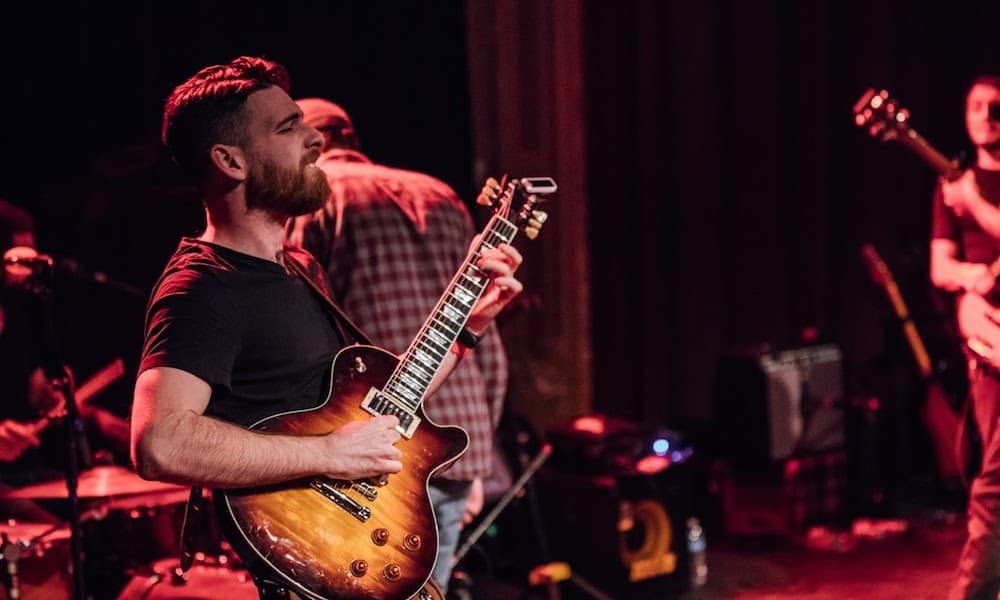Beyond the Frets
Beyond the Frets: How to Make a Living Playing Jazz Guitar

Jazz Guitar Today: Welcome to “Beyond the Frets” – a monthly column dedicated to the real-life challenges and triumphs of being a professional guitarist in the 21st century – by JGT contributor Zakk Jones.
A question I’ve often been asked is “how do you make a living playing jazz guitar?” Frankly, the short answer is “I don’t”, but, I also have a long answer for you.
Playing music professionally in 2019 is no small task, especially as a musician who even remotely exists under the colloquial jazz “umbrella”. Thankfully, there is a great deal of advantage in having the skills of a trained (conservatory or otherwise) improvising musician. But, before I go too far into what gives us that edge, let me trace some historical steps that predicates the musical climate in which we find ourselves a part of in the 21st Century.
From 1927-1930, the Duke Ellington Orchestra famously engaged audiences at the Cotton Club, a prohibition-era venue in Harlem. In 1957 Thelonious Monk landed a 6-month residency at the 5-Spot Café in New York’s hip East Village, by then an already established hub for beat-niks, artists, musicians and all kinds of folks on the fringe or avant-garde. The Dave Brubeck Quartet held court at the 5-Spot’s West Coast counterpart, The Black Hawk, for years. Regardless of musical aesthetic and geographical location, Jazz musicians up until even the late 20th century had the luxury of finding consistent work at clubs, hotels, restaurants etc. allowing a band to grow night after night, for weeks or even months on end. Talking to my friends and mentors around 15 years or older than myself, I found that this type of work was instrumental in creating not only a stable living as a working musician, but also in developing a “sound” both individually and with a group of musicians.
Coming back to the present, the opportunity to even get booked ONE night at a club is a process that requires not only a very strong musical presentation, but a proper online presence (website, EPK, records, etc.)
In the past, clubs could serve the musicians as a stable institution to foster and nurture exploration but in more recent times you need to already be a fully formed artist to even get the gig. Now, I am aware of many great clubs, venues and organizations that support folks whether it’s their first gig or their thousandth, but we must acknowledge the difference in what was available 50 years ago vs. Today.
Beyond the disparity of gigs, we’ve had an upward battle with jazz listenership over the last few decades as well. Since the mid 20th century the overall trends in the music industry have turned away from jazz and instrumental music as a whole. With an abundance of talent spilling out from conservatories, jazz studies programs, and jam sessions, where can we find the appropriate audience in 2019 for our creative outputs?
To rid any doom or gloom I may have put out there, we can certainly all agree that there are more resources available to us than ever before as a DIY-musician in the 21st Century.
Right now you’re reading this on a computer, phone or tablet, and within just a couple minutes you could be watching a Peter Bernstein masterclass, checking out all the new NAMM gear, or transcribing that killin’ Lage Lund line. With so much ability at our fingertips we can connect with friends, musicians, fans and educators in ways that most of humanity before us could never even imagine. With the myriad tools that technology provides us, it’s proven to be one of our greatest assets as musicians.
But Zakk…answer the question, how do I make a living playing jazz guitar?
Do I make a living playing only Jazz? Nope. But I DO make a living playing jazz…along with rock, funk, reggae, folk, musicals/pit work, engraving/transcriptions and teaching both privately and at a University (Go Cougars!). Having gone through a Jazz Studies program at a Liberal Arts Conservatory, pretty much everyone learned quickly that playing Jazz might not make ALL of our bread but the skills we learned as trained improvising musicians gave us the tools and experience necessary in playing gigs of all kinds at a high level. After those post-school years of being a “YES” man to every gig imaginable, I have thankfully been able to realize my own musical aesthetic and avoid opportunities that I am not personally suited for or interested in.
Having close friends and musical partners with people my own age and those who are many decades beyond me I have come to find that everyone has had to adapt and be chameleon-like musically to get consistent (and hopefully well-paying) work.

We may not have the luxury of getting a 4-week gig at a club, but we do have the resources to network, communicate, record, livestream, and most importantly ENCOURAGE each other in the scene.
I can’t stress enough how having a strong, supportive, network is instrumental in the success of a “music city”. Bad attitudes, chipped shoulders and vibing doesn’t get you a gig and in my experience the most talented, musical, versatile players are often the most humble, generous and accepting group of people around.
I have a lot to talk about, and a lot of these points I’m bringing up will be seeds for later musings…but for now I’m sure you’ve gotten get back to the shed (have you harmonized your melodic minor scales in spread triads today??)
Until next time,
Zakk
Photo credits (Zakk Jones) – Emma Parker
-
Jazz Guitar Lessons2 weeks ago
New JGT Guitar Lesson: Analyzing “Without A Song”
-
Jazz Guitar Lessons4 weeks ago
New JGT Guitar Lesson: Considering “Falling Grace”
-
Artist Features1 week ago
New Kurt Rosenwinkel JGT Video Podcast – July 2024
-
Artist Features2 weeks ago
JGT Talks To Seattle’s Michael Eskenazi



















